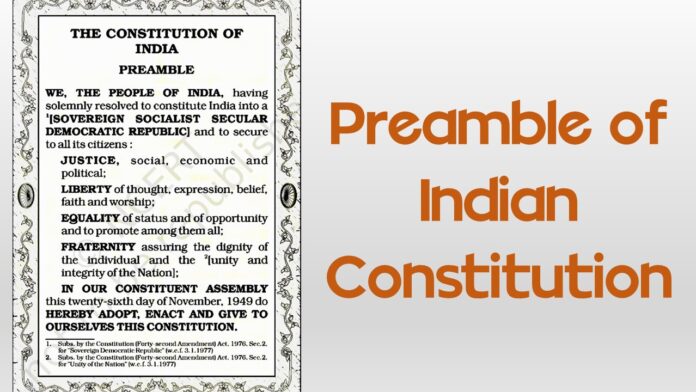When the general philosophy of the Constitution’s founding constitution and its Articles themselves made plain the high goals that the Indian state had committed itself to, the original Constitution’s founders did not feel the need to explicitly mention either phrase. The two words were added to the Preamble of the Constitution in 1976 during Indira Gandhi’s Emergency regime.
Adhir Ranjan Chowdhury, the leader of the Congress in the Lok Sabha, asserted that the Preamble of the Indian Constitution, copies of which were sent to MPs on Tuesday (September 19), lacked the phrases “socialist” and “secular.”
The Preamble did not formerly include these two words. The Constitution (42nd Amendment) Act, which was passed in 1976 during the Emergency imposed by the then-prime minister Indira Gandhi, introduced them.
In particular, the categorization of India as a “secular” nation has been hotly contested over the past four decades. Detractors, primarily from the Right, have asserted that these “imposed” terminology support “pseudo-secularism,” “vote-bank politics,” and “minority appeasement.”
Let’s start by defining the Constitution’s Preamble.
Each Constitution expresses an ideology. The Objectives Resolution, which was approved by the Constituent Assembly on January 22, 1947, provided a concise statement of the principles guiding the Indian Constitution. The objective set forth in the Objectives Resolution is described in the Preamble of the Constitution. The Constitution’s fundamental tenets and objectives are contained in it, serving as an introduction to the document.
The Constitution’s Preamble, which went into effect in 1950, stated:
“WE, THE PEOPLE OF INDIA, having solemnly resolved to establish India as an SOVEREIGN DEMOCRATIC REPUBLIC and to provide for the following rights for all of its citizens:
social, economic, and political justice;
LIBERTY of the mind, of speech, of religion, and of belief;
EQUALITY of opportunity and status;
and to encourage them all
FRATERNITY ensuring the worth of each person and the cohesion of the nation;
We now ADOPT, ENACT, and GIVE TO OURSELVES THIS CONSTITUTION IN OUR CONSTITUENT ASSEMBLY this twenty-sixth day of November, 1949.
Where did the terms “socialist” and “secular” originate then?
The term “socialist” will be examined first.
Throughout her tenure in office, Indira made an effort to solidify her support among the populace by projecting a socialist and pro-poor image with catchphrases like “garibi hatao” (Eradicate Poverty). To emphasize that socialism was the aim and philosophy of the Indian state, her Emergency administration added the phrase to the Preamble.
However, it must be emphasized that the socialism that the Indian state envisioned was not the socialism that the USSR or China at the time practiced; it did not call for the nationalization of all of India’s industrial facilities. Indira stated explicitly that “we have our own brand of socialism” and that “we will nationalise [only] the sectors where we feel the necessity.” Just nationalization, she emphasized, is not our brand of socialism.
The term “secular” is another issue.
Enshrining the principle of “secularism” in the Preamble aimed to foster the solidarity and brotherhood of India’s people, who profess a variety of religious views, despite these differences.
This essentially means that the state upholds no one religion as a “state religion,” protects all religions equally, and maintains neutrality and impartiality toward all religions.
A secular Indian state was established on the premise that it is more interested in the relationship between people than in the relationship between people and God, which is a matter of personal conscience and choice. Therefore, the Indian Constitution’s secularism is a matter of legislation rather than a matter of religious sentiment.
The Constitution’s Articles 25 through 28 guarantee the secular nature of the Indian state.
However, even before the 42nd Amendment, secularism was a fundamental aspect of the Constitution.
Yes, it was fundamentally a part of the Constitution’s guiding principles from the beginning. The founders of the Indian Republic specifically intended for Articles 25, 26, and 27 to advance and promote the Constitution’s secularism. The 42nd Amendment did nothing more than legally incorporate the phrase into the Constitution and make plain what was always implied in the Constitution’s many clauses and overall idea.
The Constituent Assembly particularly debated adding these phrases to the Preamble but opted against doing so. Dr. B R Ambedkar made the following argument in response to members like K T Shah and Brajeshwar Prasad who demanded that these phrases be added to the preamble:
“What should be the policy of the State, how the Society should be organized in its social and economic side are topics that must be chosen by the people themselves according to time and circumstances. It cannot be stipulated in the Constitution itself since doing so would completely undermine democracy.
In addition, Ambedkar stated: “My contention is that what is suggested in this amendment is already contained in the draft Preamble.”
Has this subject also been covered previously?
The words “socialist” and “secular” have been omitted from the Preamble on a number of occasions, most recently in a petition submitted by former BJP MP Subramanian Swamy to the Supreme Court last year.
Also earlier, comparable petitions were submitted. Other petitioners contend that these terms were not meant to be included in the Constitution and that the Parliament does not have the authority to modify the Constitution in accordance with Article 368.
Rakesh Sinha, a BJP member, proposed a proposal in the Rajya Sabha in 2020 to strike the word “socialist” from the Preamble, arguing that “you cannot tie a generation to a specific way of thought. In addition, the Congress party, which dominated the nation for seven decades, switched from socialism to welfare to neo-liberalism. Its new liberal policies from the 1990s contradict its prior stances.
An image of the Indian Constitution’s Preamble without the words “socialist” or “secular” was used by the Ministry of Information and Broadcasting earlier in 2015, which drew some controversy. Then Union Minister Ravi Shankar Prasad questioned, “Did Nehru have no idea of secularism? Throughout the Emergency, these words were added. What harm could possibly result from a discussion about it? We have presented the original Preamble to the country.
The Supreme Court turned down a petition in 2008 that called for the word “socialist” to be removed. “Why do you consider socialism in the limited sense that Communists understood it? In a broader sense, it refers to citizen welfare programs. It is a feature of democracy, according to a three-judge panel led by the former Chief Justice of India, K G Balakrishnan. It doesn’t have a clear meaning. It takes on diverse meanings at various points in time.




































